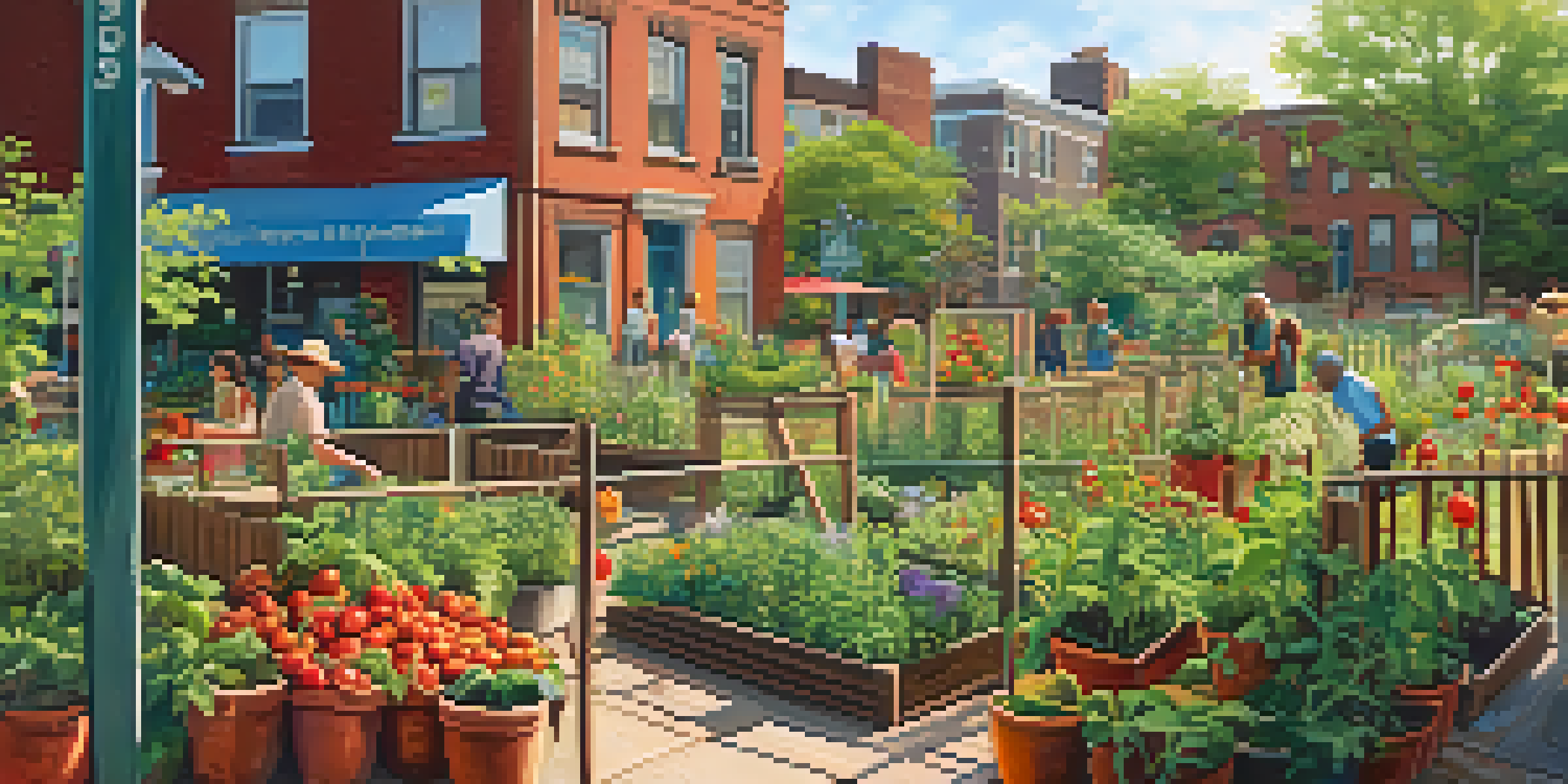Exploring Community Gardens: A Vital Resource for Jersey City

The Role of Community Gardens in Urban Areas
Community gardens serve as green oases in bustling urban landscapes, offering a space for residents to connect with nature. In Jersey City, these gardens provide not only fresh produce but also a sense of community among diverse populations. They are essential for improving air quality, reducing heat, and promoting biodiversity in an otherwise concrete-dominated environment.
To plant a garden is to believe in tomorrow.
Moreover, community gardens often act as gathering places where people from different backgrounds come together, fostering friendships and collaboration. This interaction can lead to increased civic engagement, as participants take pride in their shared space and work together for its upkeep. Thus, community gardens become a vital resource that enhances both the physical and social fabric of the city.
In essence, they symbolize the spirit of community resilience, offering a sustainable way to utilize land and promote healthy living. As urban areas continue to expand, the importance of such green spaces cannot be overstated—they are key to nurturing both the environment and the community.
Benefits for Mental Health and Wellbeing
Gardening has long been associated with mental health benefits, and Jersey City's community gardens are no exception. Engaging with plants and nature can reduce stress, anxiety, and depression, providing a therapeutic escape from the hustle and bustle of daily life. The act of nurturing a garden allows individuals to find solace, focus their thoughts, and enjoy a sense of accomplishment as they watch their efforts bear fruit.

Additionally, the social aspect of community gardening further enhances mental wellbeing. Participants often share stories, cultivate friendships, and support each other through challenges, creating a strong support network that can help combat feelings of isolation. This sense of belonging is crucial, especially in urban environments where loneliness can often prevail.
Community Gardens Foster Connection
These gardens create shared spaces where residents from diverse backgrounds can connect, collaborate, and build lasting friendships.
Ultimately, community gardens in Jersey City not only beautify the landscape but also serve as sanctuaries for mental health, reminding us of the healing power of nature and community connection.
Promoting Sustainable Practices
Community gardens play a pivotal role in promoting sustainable practices within Jersey City. By encouraging local food production, these gardens reduce reliance on store-bought produce, which often travels long distances and contributes to carbon emissions. This shift not only benefits the environment but also supports local economies and fosters a culture of sustainability.
Gardening adds years to your life and life to your years.
Moreover, many community gardens practice organic gardening techniques, avoiding harmful pesticides and chemicals that can negatively impact the ecosystem. This approach not only protects local wildlife but also ensures the food grown is healthier for the community. Educational workshops on composting, water conservation, and gardening techniques further empower residents to adopt sustainable habits.
In this way, community gardens can inspire a more eco-conscious mindset among urban dwellers, demonstrating that even small-scale efforts can lead to significant environmental impact.
Culinary Adventures in the Garden
Community gardens provide a unique opportunity for culinary exploration in Jersey City. With a variety of fruits, vegetables, and herbs available, gardeners can experiment with new recipes and ingredients that they might not typically find in grocery stores. This hands-on approach to cooking encourages healthy eating habits and a deeper appreciation for fresh, seasonal produce.
Many community gardens also host cooking classes and potluck events, allowing participants to share their culinary creations and learn from one another. These gatherings not only foster creativity in the kitchen but also strengthen community bonds as residents come together to celebrate their harvests. It’s a delicious way to experience the fruits of their labor!
Promoting Sustainability in Cities
Community gardens encourage local food production and sustainable practices, reducing environmental impact while benefiting local economies.
Ultimately, the culinary adventures that stem from community gardening enrich the local food culture, encouraging residents to embrace farm-to-table dining and explore diverse cuisines.
Educational Opportunities for All Ages
Community gardens in Jersey City serve as living classrooms, offering educational opportunities for individuals of all ages. Schools often partner with these gardens to provide hands-on learning experiences for students, teaching them about biology, ecology, and nutrition in an engaging way. This connection to nature can ignite a passion for environmental stewardship and healthy living among young learners.
For adults, workshops on gardening techniques, composting, and sustainable practices enhance knowledge and skills essential for successful gardening. These sessions empower individuals to grow their own food, fostering self-sufficiency and resilience in their communities. Additionally, many gardens host events that highlight local environmental issues, raising awareness and inspiring action.
In this way, community gardens not only cultivate plants but also promote lifelong learning, making them an invaluable resource for educational growth in Jersey City.
Building Stronger Neighborhood Connections
Community gardens are powerful tools for building stronger neighborhood connections in Jersey City. They create a shared space where residents can come together, share resources, and collaborate on projects that enhance their community. This sense of ownership and pride fosters a more cohesive neighborhood where people look out for one another.
As residents work side by side, they develop friendships that can lead to deeper community ties. This camaraderie can manifest in various forms, from organizing neighborhood clean-up days to advocating for local policy changes. Ultimately, these connections strengthen the social fabric of the community, making it more resilient and vibrant.
Educational Resources for All Ages
Serving as living classrooms, community gardens provide hands-on learning experiences, inspiring a passion for ecology and healthy living.
In essence, community gardens are more than just plots of land; they are catalysts for community engagement and collective action, reminding us of the power of collaboration.
Challenges and Opportunities for Growth
While community gardens offer numerous benefits, they also face challenges that require attention. Limited funding, access to land, and maintaining volunteer interest can hinder their growth and sustainability. However, these challenges also present opportunities for innovation and community involvement, as residents work together to find creative solutions.
For instance, local organizations can collaborate with city officials to secure funding and resources to support community gardens. Additionally, engaging more volunteers through outreach and education can help maintain enthusiasm and involvement. By fostering a culture of stewardship and collaboration, communities can overcome these obstacles and ensure their gardens thrive.

Ultimately, addressing these challenges head-on not only ensures the longevity of community gardens but also strengthens the bonds within neighborhoods as residents unite for a common cause.